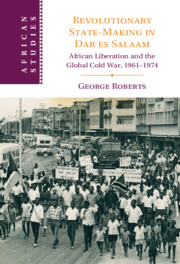Revolutionary State-Making in Dar es Salaam
Tracing Dar es Salaam’s rise and fall as an epicentre of Third World revolution, George Roberts explores the connections between the global Cold War, African liberation struggles, and Tanzania’s efforts to build a socialist state. Instead of understanding decolonisation through a national lens, he locates the intersection of these dynamics in a globally connected city in East Africa. Revolutionary State-Making in Dar es Salaam introduces a vibrant cast of politicians, guerrilla leaders, diplomats, journalists, and intellectuals whose trajectories collided in the city. In its cosmopolitan and rumour-filled hotel bars, embassy receptions, and newspaper offices, they grappled with challenges of remaking a world after empire. Yet Dar es Salaam’s role on the frontline of the African revolution and its provocative stance towards global geopolitics came at considerable cost. Roberts explains how Tanzania’s strident anti-imperialism ultimately drove an authoritarian turn in its socialist project and tighter control over the city’s public sphere.
George Roberts is Lecturer in Modern African History at King’s College London, where his research focuses on the international history of decolonisation in Eastern Africa. He was previously a Junior Research Fellow at Trinity College, University of Cambridge. He was awarded PhD by the University of Warwick in 2016, which was shortlisted for the Audrey Richards Prize for the best doctoral thesis in African Studies by the African Studies Association of the UK in 2018. This title is also available as Open Access on Cambridge Core.

